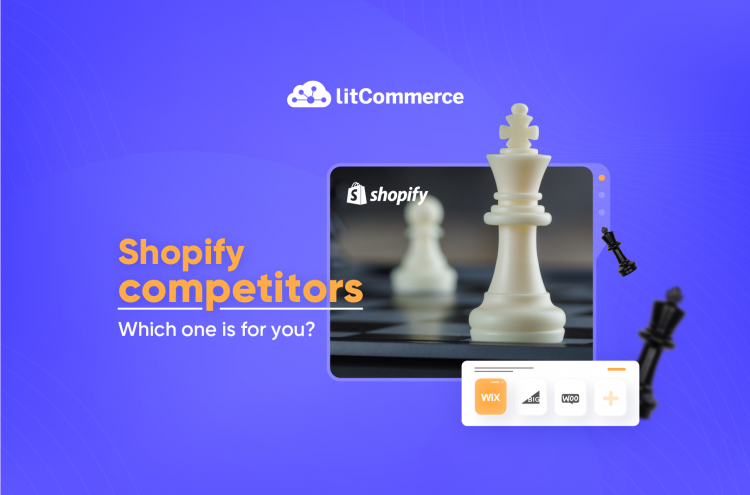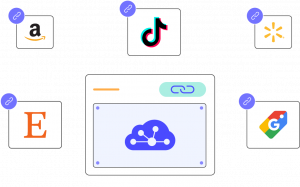Shopify is among the most widely used eCommerce platforms, powering over 4.5 million active online stores worldwide (BuiltWith).
However, Shopify is not the only option for building and managing an eCommerce website. Several Shopify competitors offer comparable features, flexible pricing, and scalability for different types of online sellers.
After trying and comparing various platforms, here are the top 11+ eCommerce platforms that are similar to Shopify, including:
- BigCommerce
- WooCommerce
- Wix
- Squarespace
- Ecwid
- Shift4Shop
- Magento
- NetSuite
- Sellfy
- BigCartel
- OpenCart
- Volusion
Without further ado, let’s explore!
Grow Your Business with Shopify x Squarespace Selling
Top 12 Shopify Competitors
After testing and comparing multiple eCommerce platforms, we’ve identified the top 11+ Shopify alternatives that stand out in terms of performance, flexibility, and overall value.
In this guide, we share our professional insights, hands-on experiences, and key recommendations to help you choose the right platform whether you’re currently using Shopify and exploring new options or just starting your journey in eCommerce.
Check out this side-by-side look at Shopify alternatives:
| Platform | Rating (Data from G2) | Starting Price | Better than Shopify | Recommended for |
| BigCommerce | 4.2/5 ⭐(558 reviews) | 39$ monthly | Customization, apps, SEO, and transparent fees. | Medium to large businesses |
| WooCommerce | 4.4/5 ⭐(1,199 reviews) | About $20–30 monthly (estimated) | SEO, payment options, and plugin flexibility | Small to medium businesses |
| Wix | 4.2/5 ⭐(1,757 reviews) | 17$ monthly | Ease of use and design flexibility | Small businesses & startups |
| Squarespace | 4.4/5 ⭐(1,096 reviews) | 25$ monthly | Design customization and blogging features | Creative & service businesses |
| Ecwid | 4.7/5 ⭐(402 reviews) | 5$ monthly | Adding eCommerce to existing sites | Existing offline or content businesses |
| Shift4Shop | 3.9/5 ⭐(37 reviews) | 29$ monthly | SEO tools and affordability | Budget-conscious businesses |
| Magento | 4/5 ⭐(253 reviews) | About $50-200 monthly (estimated) | Flexibility, scalability, and community support | Enterprise-level businesses |
| GoDaddy | 4/5 ⭐(2,021 reviews) | 9,99$ monthly | Ease of use, low starting cost, and additional service | New small businesses |
| Sellfy | 3.9/5 ⭐(54 reviews) | 29$ monthly | Selling digital products and simplicity for small businesses | Digital product businesses |
| BigCartel | n/a | Free | Simplicity, ease of use, and built-in print-on-demand. | Independent creators |
| OpenCart | 4.3/5 ⭐(105 reviews) | About $20-70 monthly (estimated) | Multi-store management and flexibility for tech-savvy users | Tech-driven businesses |
| Volusion | 3.2/5⭐(65 reviews) | 35$ monthly | Inventory management, analytics, and scalability | Retail & inventory-heavy businesses |
1. BigCommerce

BigCommerce is a SaaS eCommerce platform and a strong Shopify competitor in the cloud-based retail software market. It supports multi-channel selling, API-driven customization, and enterprise-grade scalability, making it ideal for growing merchants and large brands seeking a Shopify alternative with built-in SEO tools and transparent pricing.
What we like
- Quickly access APIs
- Rich built-in features from management and payment to marketing
- Advanced SEO features
- No hidden fees
What we dislike
- Limited free themes
- Not 100% for Non-techies
Pricing
- Standard: $29/month
- Plus: $79/month
- Pro: $299/month
- Enterprise
The Verdict
BigCommerce is a leading Shopify alternative with a 15-day free trial, built-in SEO tools, advanced customization, and transparent pricing without transaction fees, ideal for tech-savvy sellers seeking greater control over design, integrations, and scalability, though its interface is slightly more complex than Shopify’s.
2. WooCommerce
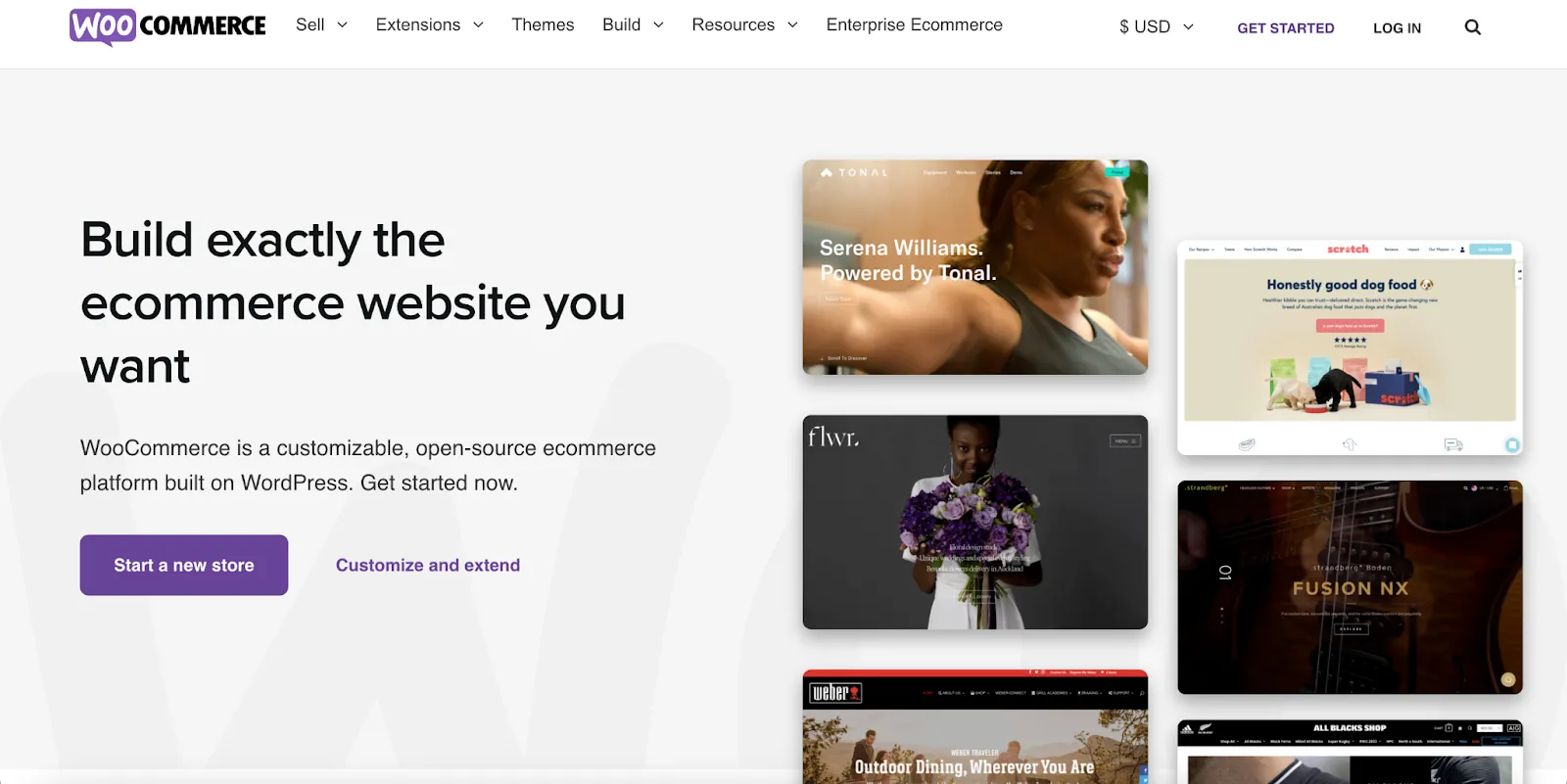
WooCommerce is an open-source Shopify alternative and the official WordPress eCommerce plugin. As a self-hosted platform, it lets users turn any WordPress site into a fully customizable online store with full control over design, features, data and it’s free to install and use.
What we like
- Strong foundation for SEO.
- Easy install SEO plugins like Yoast SEO.
- Numerous payment gateways, such as PayPal, Stripe, Apple Pay, and Google Pay.
- No transaction fees, whereas Shopify claims to charge a lot on this.
- Larger selection of plugins with over 55,000 plugins available.
What we dislike
- Require complex technical skills.
- Need a lot of apps.
Pricing
- Themes: $0 to $100/year.
- Hosting: $4.95 to $50/month.
- Domain name: $10 to $20/year.
The Verdict
WooCommerce is a top Shopify alternative for merchants with technical expertise who value SEO control, flexible payments, and extensive plugin integrations, offering greater customization freedom than Shopify, which better suits sellers seeking an easier, more managed setup.
3. Wix

Wix is a cloud-based website builder and eCommerce platform often considered a popular Shopify competitor. Founded in 2006, Wix enables users to create professional, responsive websites through an easy drag-and-drop editor, complete with hosting, customizable templates, and built-in eCommerce tools for online selling.
What we like
- Affordable pricing plans start from only $17/month.
- Wide range of built-in marketing features, including email marketing, social media integration, and SEO tools.
- Great templates include 800+ visually stunning and customizable templates.
- Have Wix ADI (Artificial Design Intelligence) to support sellers.
What we dislike
- Ads on Free Plan.
- Not completely mobile-friendly.
Pricing
- Free.
- Light: $17/month.
- Core: $29/month.
- Business: $36/month.
- Business Elite: $159/month.
The verdict
Choose Wix for its ease of use, design flexibility, and small-scale eCommerce suitability, while Shopify offers scalable, robust features and tools for efficient online store growth.
4. Squarespace

Squarespace is a website builder and SaaS eCommerce platform, often recognized as one of Shopify’s top competitors. Originally built for designers, artists, and photographers, Squarespace combines creative design tools, customizable templates, and built-in eCommerce features that let users build professional websites without any coding knowledge.
What we like
- Excellent blogging features, including social media integration, commenting, and post-scheduling.
- A variety of templates that are easy to customize.
- Integrates with Square POS.
What we dislike
- No free plan.
- Unavailable phone support.
Pricing
- Free.
- Basic: $16/month.
- Business: $23/month.
- Plus: $39/month.
- Advanced: $99/month.
The Verdict
Squarespace suits sellers who prioritize blogging and creative design freedom, offering more visually customizable templates than Shopify for building appealing online stores.
5. Ecwid

Ecwid is a cloud-based eCommerce platform and a lightweight Shopify alternative designed for small businesses. Known for its easy integration, Ecwid lets users add an online store to any existing website or social media page through a simple embeddable widget. It also offers a free plan, no additional transaction fees, and an optional standalone “Instant Site” for those who want a separate storefront.
What we like
- Easy to set up and use.
- Integrate with current sites, content management systems, and social media platforms.
- No transaction fees.
What we dislike
- No product variations.
- SEO limited.
- Can not edit orders with Free and Venture plans.
Pricing
- Starter: $5/month
- Venture: $25/month.
- Business: $45/month.
- Unlimited: $105/month.
The Verdict
Ecwid allows sellers to easily add eCommerce features to existing websites, with a free plan ideal for small businesses or individuals starting to sell online.
6. Shift4Shop

Shift4Shop is a cloud-based eCommerce platform and a free Shopify alternative tailored for small businesses and new online stores. Formerly known as 3dcart, it offers a drag-and-drop website builder, social media integration, email marketing tools, inventory management, API access, and secure SSL hosting, all included in its free plan.
What we like
- Easy to set up and use.
- Integrate with current sites, content management systems, and social media platforms.
- No transaction fees.
What we dislike
- No product variations.
- SEO limited.
- Can not edit orders with Free and Venture plans.
Pricing
- End-to-End eCommerce: Free
- Basic Store: $29/month.
- Plus Store: $79/month.
- Pro Store: $229/month.
The Verdict
Shift4Shop is a strong Shopify alternative for sellers prioritizing SEO and affordability. It offers SEO-friendly URLs, automated sitemaps, and customizable meta descriptions to improve rankings, with accessible pricing for new sellers.
7. Magento

Magento, now known as Adobe Commerce, is an open-source eCommerce platform designed for enterprise-level scalability and customization. This self-hosted Shopify competitor offers a powerful CMS, multi-store management, advanced SEO features, and extensive third-party integrations, making it ideal for developers and large businesses seeking full control over their online store infrastructure.
What we like
- High flexibility and customization.
- Built-in functionalities for SEO, including changing URL structure.
- Can handle high volumes of traffic and transactions.
- Omnichannel support.
What we dislike
- High technical barriers for beginners.
- Very high fees.
The Verdict
This Shopify alternative offers strong flexibility, scalability, and community support, ideal for larger businesses needing advanced customization. However, it may not suit small sellers seeking a simpler, low-maintenance eCommerce solution.
8. GoDaddy
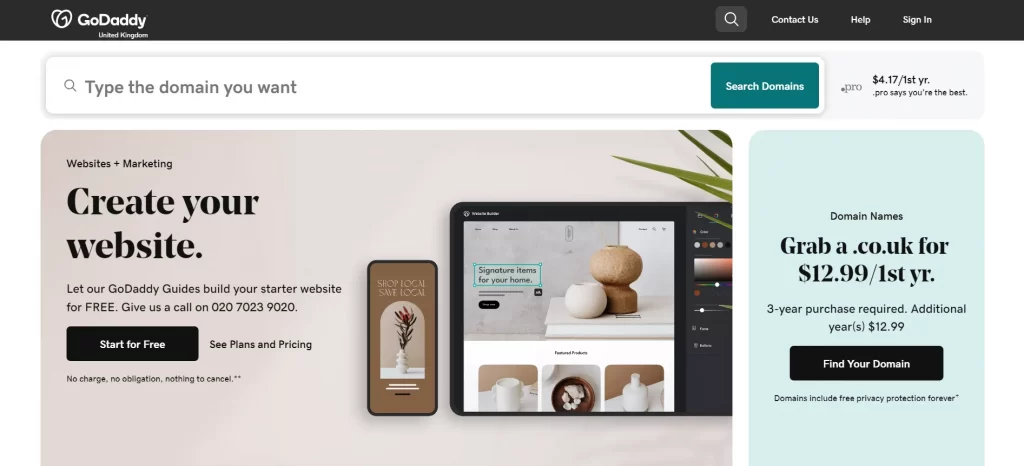
GoDaddy is a cloud-based website builder and eCommerce platform that stands as one of Shopify’s key competitors. Known for its simplicity and affordable pricing, GoDaddy enables individuals and small businesses to build mobile-friendly online stores with drag-and-drop customization, built-in hosting, SSL security, and integrated marketing tools, all without requiring technical expertise.
What we like
- Free domain name registration.
- 24/7 customer support.
- Users friendly interface.
- Free professional email marketing send.
- Free SSL.
What we dislike
- Slow customer support.
- Security tools cost extra.
Pricing
- Basic: $9.99/month.
- Plus: $14.99/month.
- Commerce: $20.99/month.
The Verdict
GoDaddy is ideal for beginners, small websites, and businesses needing VPS hosting or eCommerce solutions, offering ease of use, low introductory pricing, and bundled services like hosting and email.
9. Sellfy
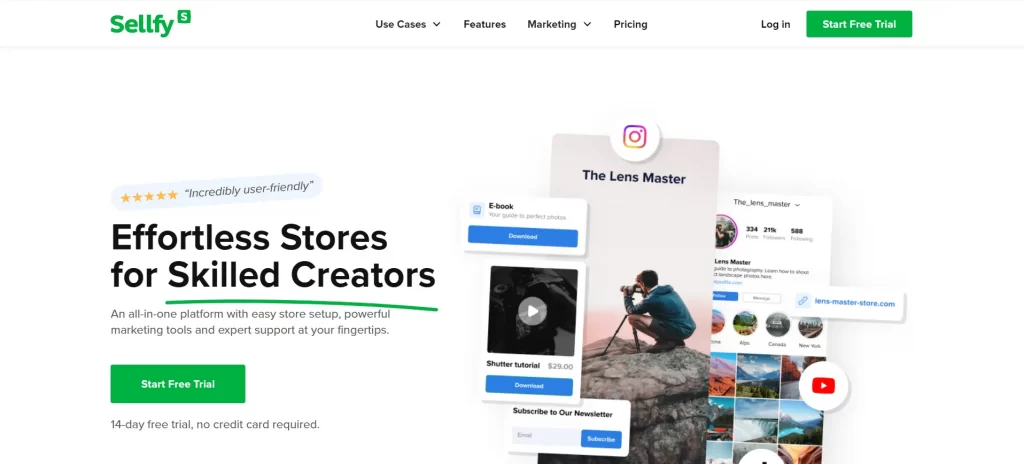
Sellfy is a cloud-based eCommerce platform built for creators, artists, and digital entrepreneurs. As a growing Shopify competitor, it allows users to sell digital downloads, physical products, subscriptions, and print-on-demand merchandise through fully customizable online stores. With its simple setup, built-in marketing tools, and no coding requirements, Sellfy is ideal for small brands looking for a lightweight Shopify alternative.
What we like
- Support for multiple product types (digital, physical, subscriptions, print-on-demand).
- No need to spend money on merchandise you may not sell. Sellfy will print merchandise for you and ship it to your customer.
- Allows launching an affiliate program inside the app.
- Support built-in print-on-demand functionality.
What we dislike
- Customization options are restricted.
- Limited integrations.
Pricing
- Starter: $22/month.
- Business: $59/month.
- Premium: $119/month.
The Verdict
Sellfy is built for digital creators selling ebooks, music, videos, and courses. It features an intuitive interface, customizable storefronts, and print-on-demand options, making it ideal for startups and small businesses.
10. BigCartel
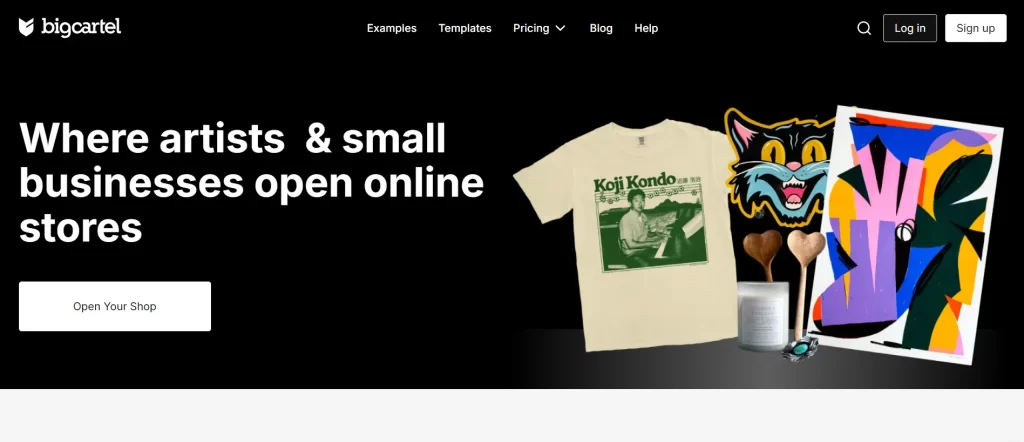
Big Cartel is a hosted eCommerce platform and one of the most popular Shopify competitors for independent creators and small businesses. Founded in 2005, it offers a simple, user-friendly interface and a free plan that makes it easy to launch an online store quickly. With built-in print-on-demand options, social media integration, and mobile-friendly design, Big Cartel is ideal for artists and entrepreneurs seeking a minimalist Shopify alternative.
What we like
- Easy to use.
- Free plan and themes.
- Affordable price.
- No transaction fee.
What we dislike
- Maximum of 500 products.
- Not scalable, only has basic features.
- Weak search engine optimization (SEO) features.
Pricing
- Gold: $0/month.
- Platinum: $15/month.
- Diamond: $30/month.
The Verdict
Big Cartel is a simple, user-friendly Shopify alternative ideal for creators and small businesses. It allows quick store setup and includes built-in print-on-demand features.
11. OpenCart
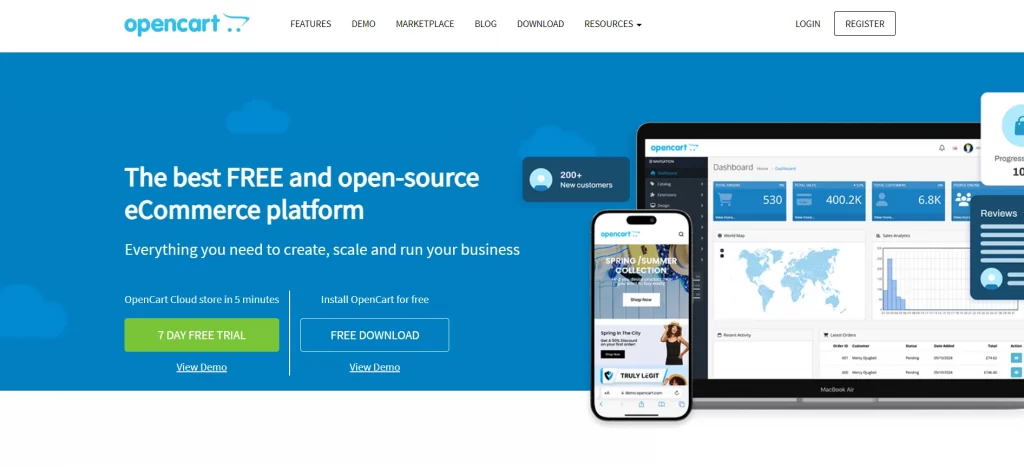
OpenCart is a user-friendly and powerful open-source platform on the list of Shopify competitors for managing online stores. It allows you to manage multiple stores from a single backend, giving you complete control over the design and functionality. The platform is easy to customize, with an administrative area that simplifies tasks, just fill in forms and click “Save.” Additionally, it has numerous professionally developed extensions available to tailor the store to your specific needs.
What we like
- Free to download and install.
- Easily manage multiple stores from one admin interface.
- Support 50+ payment gateways.
- Support Chrome extensions.
- Wide range of themes and plugins available.
- Compatible with mobile and tablet.
What we dislike
- Low loading speed.
- Difficult to import inventory list.
Pricing
- Hosting fees: $300 – $1,200/year.
- Domain name: $10/year.
- SSL certificate: $10 – $200/year.
- Theme costs: $0 – $100 for a one-time purchase.
- Additional extensions/plugins: $0 – $500/year.
The Verdict
OpenCart is a great option for tech-savvy users comfortable with coding and server management. It supports multiple storefronts, making it ideal for businesses with several brands, product lines, or regional stores.
12. Volusion

Volusion is a cloud-based eCommerce platform and one of the most established Shopify alternatives, offering tools for building, designing, and managing online stores. It enables merchants to create professional storefronts using responsive themes, an intuitive drag-and-drop editor, and built-in marketing features. As a reliable Shopify competitor, Volusion is ideal for small to mid-sized businesses looking for an all-in-one solution to manage inventory, payments, and customer engagement from a single dashboard.
What we like
- User-friendly interface and easy setup for storefronts.
- Good speed and performance.
- Support built-in SEO management, newsletters, a CRM system, and more.
- Has a mobile app for you to manage your online store.
What we dislike
- No blogging functionality.
- Limited customization options.
Pricing
- Personal: $35/month.
- Professional: $79/month.
- Businesse: $299/month.
- Prime: Contact sales.
The Verdict
Volusion is best suited for businesses with technical expertise seeking a scalable online store. It stands out for its strong inventory management and analytics but isn’t ideal for beginners, tight budgets, or those needing deep customization.
How Do You Choose a Shopify Alternative?
When helping merchants choose the best Shopify alternatives, we focus on solutions that balance flexibility, cost efficiency, and long term growth potential.
To evaluate these platforms, we reviewed pricing structures, customization options, and built in features, ensuring they can support sellers without relying on expensive add ons. Here’s what we looked at:
Reasonable pricing with built-in features: Does the platform provide essential eCommerce tools at affordable rates, without forcing sellers into costly subscriptions or third party apps? For merchants who want to save money on Shopify monthly subscriptions, free or low cost options like WooCommerce and Shift4Shop are great for budget conscious sellers.
Customization: Can sellers easily tailor storefronts to match their brand and enhance functionality? Platforms like BigCommerce and WooCommerce offer advanced theme editing and access to underlying code, ideal for tech savvy entrepreneurs.
Advanced SEO features: Does the platform support strong search visibility with tools such as customizable URLs, meta tags, and automated sitemaps? BigCommerce, Wix, and Shift4Shop stand out for their robust SEO toolsets.
We also reviewed how each platform’s built-in capabilities help merchants scale without overspending as their business grows.
Shopify Competitors – FAQs
- Which is better than Shopify?
The top 6 Shopify competitors are BigCommerce, WooCommerce, Wix, Squarespace, Shift4Shop, and Ecwid. In general, these sites like Shopify have several features that can cover the disadvantages of Shopify, such as hidden fees, limited SEO abilities, or low customization.
- What companies are top Shopify competitors?
Despite its great popularity, Shopify is not the only solution for eCommerce enthusiasts. There are enormous options to choose from if you search for Shopify alternatives. Here are the top 6 sites like Shopify that you can take a look at:
- BigCommerce;
- WooCommerce;
- Wix;
- Squarespace;
- Ecwid;
- Shift4Shop.
- What are the disadvantages of Shopify?
Shopify’s reputation has been ubiquitous as a SaaS that allows businesses of all sizes to start selling online. However, the platform is not always perfect for every seller. There are several drawbacks or limitations that might be the main obstacle for Shopify sellers to sell their products successfully, including:
- Extra and hidden fees;
- No advanced SEO functions;
- Low customization and scalability.
Final Words
In the rising era of eCommerce, choosing the right platform may help sellers hit all the right spots to become a 6-figure business. In general, Shopify may not be the only choice for every merchant. There are numerous Shopify competitors that can satisfy your needs with some unique features.
We hope this article can help you come up with a fine decision on choosing where to sell. Additionally, we also provide more eCommerce information, insights, sharing, and tips that might be helpful for you on this competitive journey. Take a look at LitCommerce retailers’ blog!
Last but not least, with an appropriate multichannel selling strategy, you can even grow beyond a site like Shopify. Drop us a message to figure out how you can expand your selling site into top eCommerce marketplaces at a glance with LitCommerce. Happy selling!

